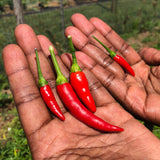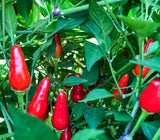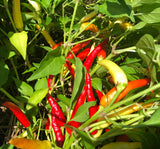Piri Piri Mix
Capsicum frutescens
This is a diverse pepper mix that came to us with the name Piri Piri, with fruits ranging from ½" to 2" long, and from ¼" to ½" wide. Traditionally, Piri Piri peppers are an African Bird's Eye Chili type, with small, very hot fruits ranging from ¼" to 1¼" long. Most fruits start out green, though some start out white, and all turn bright red.
This is a variety of Capsicum frutescens brought by Portuguese from South America to Mozambique, where it became an essential flavor of many dishes, including Chicken Peri Peri. It is now very popular in Mozambique, South Africa, Zimbabwe, and Angola in particular. It has also reached Brazil, Portugal, India, Ethiopia, and Nigeria.
I received the seeds from Dorene Pasekoff of Hill Creek Farm. She received them from seed keeper friend Daniel Aguera, who got them from a chef/gardener friend in New Orleans.
Note: we believe this is a variety of Capsicum frutescens, but acknowledge that we are not 100% certain.
Also known as Peri Peri, Piri-Piri, Piripiri, Pili Pili, and African Bird's Eye Pepper.
Days to maturity: 75-80
Seeds per pack: 25
Germination rate: 94% on 03/21/2025
Planting / harvesting notes
Start seeds indoors 8-10 weeks before the last frost and transplant into garden well after the danger of frost. Keep seedlings moist but do not overwater. Transplants should be initially watered in well, and plants will be most productive with regular irrigation and full sun.
Seed keeping notes
Peppers are generally self-pollinating, though we isolate different varieties of the same species by at least 50 feet, in hopes that flying insects will not cross pollinate them unexpectedly. There are several important species of peppers, so check your scientific names! Pepper seeds are ripe when the fruits have turned their final fiery color - in this case, fully red. Cut the fruit, scrape out seeds, and lay them out to dry on a labeled screen or paper product in a ventilated place away from direct sunlight for a week or two. Drying the peppers before seed extraction can slightly lower your germination rates, but works fine for home seed saving as long as the peppers do not rot.











